无锡概况(英文)
- 格式:doc
- 大小:23.00 KB
- 文档页数:2
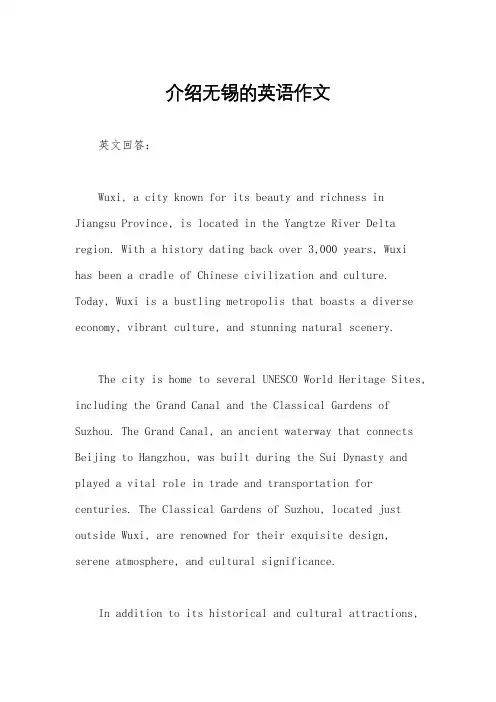
介绍无锡的英语作文英文回答:Wuxi, a city known for its beauty and richness in Jiangsu Province, is located in the Yangtze River Delta region. With a history dating back over 3,000 years, Wuxi has been a cradle of Chinese civilization and culture. Today, Wuxi is a bustling metropolis that boasts a diverse economy, vibrant culture, and stunning natural scenery.The city is home to several UNESCO World Heritage Sites, including the Grand Canal and the Classical Gardens of Suzhou. The Grand Canal, an ancient waterway that connects Beijing to Hangzhou, was built during the Sui Dynasty and played a vital role in trade and transportation for centuries. The Classical Gardens of Suzhou, located just outside Wuxi, are renowned for their exquisite design, serene atmosphere, and cultural significance.In addition to its historical and cultural attractions,Wuxi is also a major industrial and economic hub. The city is known for its strong manufacturing sector, particularly in the electronics, automotive, and textile industries. Wuxi is also home to several universities and research institutions, making it a hub for innovation and technological advancements.Despite its rapid development, Wuxi has managed to retain its natural beauty. The city is surrounded by lakes, rivers, and mountains, which offer ample opportunities for outdoor recreation and relaxation. Taihu Lake, the third largest freshwater lake in China, is a popular destination for boating, fishing, and swimming. The nearby Yixing region is known for its scenic tea plantations and hot springs.Wuxi's cuisine is as diverse as the city itself. Local specialties include steamed buns, wonton soup, and braised pork. The city is also known for its production of tea, particularly Longjing tea, which is highly prized for its delicate flavor and aroma.In summary, Wuxi is a vibrant and multifaceted citythat offers a rich blend of history, culture, industry, and natural beauty. Its ancient heritage, bustling economy, stunning scenery, and delicious cuisine make it a must-visit destination for travelers from around the world.中文回答:无锡,一座以秀美著称的江苏城市,位于长江三角洲地区。
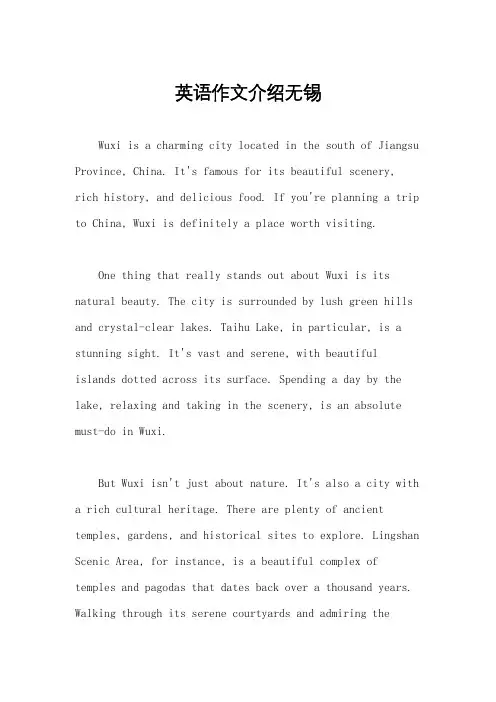
英语作文介绍无锡Wuxi is a charming city located in the south of Jiangsu Province, China. It's famous for its beautiful scenery,rich history, and delicious food. If you're planning a trip to China, Wuxi is definitely a place worth visiting.One thing that really stands out about Wuxi is its natural beauty. The city is surrounded by lush green hills and crystal-clear lakes. Taihu Lake, in particular, is a stunning sight. It's vast and serene, with beautiful islands dotted across its surface. Spending a day by the lake, relaxing and taking in the scenery, is an absolute must-do in Wuxi.But Wuxi isn't just about nature. It's also a city with a rich cultural heritage. There are plenty of ancient temples, gardens, and historical sites to explore. Lingshan Scenic Area, for instance, is a beautiful complex of temples and pagodas that dates back over a thousand years. Walking through its serene courtyards and admiring theintricate carvings, you can almost feel the history come alive.Of course, no trip to Wuxi would be complete without trying some of the local food. The city is renowned for its。
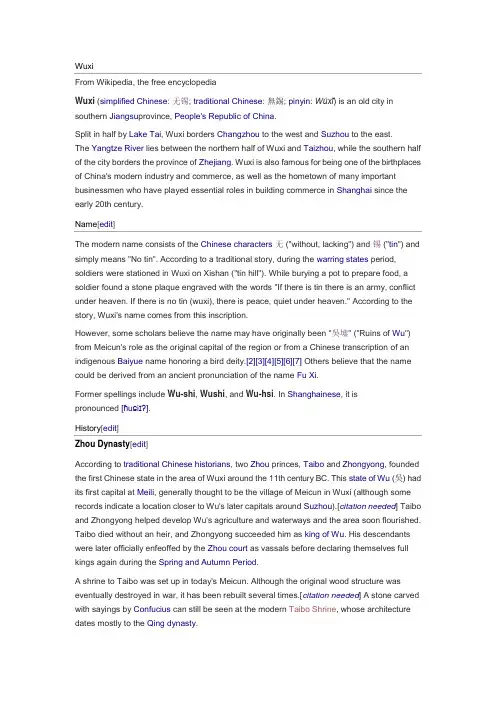
WuxiFrom Wikipedia, the free encyclopediaWuxi (simplified Chinese: 无锡; traditional Chinese: 無錫; pinyin: Wúxī) is an old city in southern Jiangsu province, People's Republic of China.Split in half by Lake Tai, Wuxi borders Changzhou to the west and Suzhou to the east.The Yangtze River lies between the northern half of Wuxi and Taizhou, while the southern half of the city borders the province of Zhejiang. Wuxi is also famous for being one of the birthplaces of China's modern industry and commerce, as well as the hometown of many important businessmen who have played essential roles in building commerce in Shanghai since the early 20th century.Name[edit]The modern name consists of the Chinese characters无 ("without, lacking") and 锡 ("tin") and simply means "No tin". According to a traditional story, during the warring states period, soldiers were stationed in Wuxi on Xishan ("tin hill"). While burying a pot to prepare food, a soldier found a stone plaque engraved with the words "If there is tin there is an army, conflict under heaven. If there is no tin (wuxi), there is peace, quiet under heaven." According to the story, Wuxi's name comes from this inscription.However, some scholars believe the name may have originally been "吳墟" ("Ruins of Wu") from Meicun's role as the original capital of the region or from a Chinese transcription of an indigenous Baiyue name honoring a bird deity.[2][3][4][5][6][7] Others believe that the name could be derived from an ancient pronunciation of the name Fu Xi.Former spellings include Wu-shi, Wushi, and Wu-hsi. In Shanghainese, it ispronounced [ɦuɕiɪʔ].History[edit]Zhou Dynasty[edit]According to traditional Chinese historians, two Zhou princes, Taibo and Zhongyong, founded the first Chinese state in the area of Wuxi around the 11th century BC. This state of Wu (吳) had its first capital at Meili, generally thought to be the village of Meicun in Wuxi (although some records indicate a location closer to Wu's later capitals around Suzhou).[citation needed] Taibo and Zhongyong helped develop Wu's agriculture and waterways and the area soon flourished. Taibo died without an heir, and Zhongyong succeeded him as king of Wu. His descendants were later officially enfeoffed by the Zhou court as vassals before declaring themselves full kings again during the Spring and Autumn Period.A shrine to Taibo was set up in today's Meicun. Although the original wood structure was eventually destroyed in war, it has been rebuilt several times.[citation needed] A stone carved with sayings by Confucius can still be seen at the modern Taibo Shrine, whose architecture dates mostly to the Qing dynasty.Spring and Autumn Period and Warring States Period[edit]The State of Wu became one of the strongest kingdoms during the Spring and Autumn Period. Sunzi (Suntzu), who wrote the famous "the Art of War" came to Wu and helped the king with his military affairs. Wu was considered one of the seven strongest kingdoms during thisperiod[citation needed]. Some of Sunzi's descendants still live in Sunxiang in Wuxi near the Plum Garden. However, Wu was later defeated by the State of Yue,today's Zhejiang and Fujian, which in turn was overthrown by the State of Chu and incorporated into Chu during the Warring States period.Qin and Han Dynasty[edit]The cultural and economic center of the "Wu" area shifted to Suzhou after the reign of thefirst Qin Dynasty emperor, Qin Shi Huang, who united China; Wuxi at that time belonged to Suzhou. During the Han dynasty, Wuxi was set up as a county by emperor Han Wudi. Historic records show that tin was discovered during the early Han era, leading to conflicts in the area. Soon, however, the tin was depleted. This was once believed to be the origin of the name Wuxi, meaning "no tin." The name was changed to Youxi (有錫), meaning "having tin", duringthe Wang Mang conflicts period because Wang wanted to change the name.Six dynasties, Tang and Song Dynasties[edit]Agriculture and the silk industry flourished in Wuxi and the town became a transportation center under the early Tang Dynasty after the construction of the Grand Canal. Although Suzhou became the center of the Wu area, Wuxi was also important in the county of Wu.Yuan, Ming and Qing Dynasties[edit]During the Ming Dynasty, Wuxi became a prosperous cultural center. During the late Ming and early Qing periods, Wuxi was a center for political discussion and public opinion. Agriculture, with rice and fish were major products in the Qing period.During the Taiping Rebellion, Wuxi was devastated by the war's destruction, like other parts of the lower Yangtze valley. Warfare disrupted planting in the region.[8] As a result of famine, city dwellers resorted to eating human flesh. There are records of sales of human flesh from this period.[9]During the late 19th century, Wuxi became a center of the textile industry in China and one of the four most important rice markets nationwide. By 1878, Wuxi was the leading silk-producing county in Jiangsu, outstripping even Suzhou, the traditional center of that industry. In the late 19th century, Wuxi was also the regional center for the waterborne transport of grain and a major commercial center.20th century[edit]During the period between 1900 and 1940, Wuxi was considered one of the most important counties in China. In dramatist Cao Yu's well-known drama "Thunderstorm", Wuxi was mentioned several times with a comment "Wuxi is a good place". After the People's Republic of China was set up by the communists in 1949, Wuxi continued to grow in importance, with theestablishment of more textile production and both light and heavy industry. This city was considered the second most important city in Jiangsu Province after the capital Nanjing. However, its developmental model has been criticized for the environmental deterioration caused. New strategies are now under consideration to ensure its sustainable development.GeographyThe city plan, as is typical of many older Chinese cities, is of a central city with a roughly circular plan, crisscrossed with older canals, the main canal still seeing heavy barge traffic.Wuxi itself is on an alluvial plain of deep sedimentary deposits cut between limestone foothills, making it one of the sources for "scholar's rocks", the intricately weathered stones which were used as devices for contemplation.Climate[edit]Wuxi is hot and humid in summer and chilly and damp in winter, with an average annual temperature of 18 °C (64 °F) and very occasional snow. Because of its proximity to the East China Sea, it has a monsoon season and receives 100 centimetres (39 inches) of rain annually.[citatDemographics[edit]According to the 2010 Census, the prefecture-level of Wuxi has a population of 6,372,624, an increase of 1,192,777 from the 2000 census, giving it an annual population growth of 20.9% for the period 2000-2010.[11]Administration[edit]See also: List of administrative divisions of JiangsuThe prefecture-level city of Wuxi administers nine county-level divisions, including7 districts and 2 county-level cities. The information here presented uses the metric system and data from 2010 Census.These districts are sub-divided into 73 township-level divisions, including 59 towns and24 subdistricts.Economy[edit]Currently Wuxi is designated as an investment grade city, and has two large industrial parks devoted to new industries.[citation needed],While being the current manufacturing centerson textiles, there are projects to move to electric motor manufacturing and MRP software development. Wuxi is the solar technology hub in China as two major photovoltaic companies are based in the city. They are Suntech Power and Jetion Holdings Ltd which were listed on overseas stock exchanges.In 2008 new energy industries were worth 37.8 Billion RMB, with the solar photovoltaic industry accounting for 30.2 Billion RMB of the total.[12] The GDP per capita was ¥107,400 (US$17,050) in 2011, ranked first in Jiangsu, ahead of Nanjing and Suzhou.[1]The center of the city is filled with modern high rise buildings and the market is being redeveloped in a postmodern style. Hynix completed a new chip plant in Wuxi.[13]Industry[edit]Wuxi New DistrictSince it was established in 1992, Wuxi New District (WND) has evolved to be one of the major industrial parks in China. A wide variety of components, sub-systems and original equipments are made in WND. Approximately 1200 enterprises have been registered in WND by the end of 2008. Wuxi New District provides strong support for international manufacturing operations. The Zone focuses on formation of the five pillar industries of electronic information, precision machinery and mechanical and electrical integration, bio-pharmaceuticals, fine chemicals and new materials.[14]Wuxi Export Processing ZoneEstablished in 1992, Wuxi Export Processing Zone is located in Wuxi New District with a planned area of 2.98 km2. The encouraged industries include electronic information,optical-mechanical-electronic-integration, precision machinery, and new materials. It is situated near to Wuxi Airport and Changzhou Port.[CultureAs an important city for the "Wu" area, its culture bears distinctive characteristics, which can be identified in its dialect, architecture, waterway transportation and various art types.[citation needed]It was one of the art and cultural centers of "Jiangnan", with several famous Chinese authors claiming Wuxi as their home town. Among them, most recently, Qian Zhongshu, authorof Fortress Besieged, a comedy of manners set in China in the 1930s. Wuxi was the birthplace of the famous Chinese (later American) artist Chen Chi (1912—2005), in whose honor a museum has been erected in the city.One of the handicraft specialties of Wuxi is the production of Huishan clay figurines.[citation needed] and clay tea pots.In modern times Wuxi has produced a number of cultural figures such as HuaYanjun (1893–1950) also known as "Blind Abing" (瞎子阿炳), famous forhis erhu and pipa music. Another famous musician is Liu Tianhua, who was the first to compile folk music using staff.Transport[edit]Railways[edit]Wuxi is situated on the Shanghai–Nanjing Intercity High-Speed Railway, linking it directly with the provincial capital of Nanjing (1.5 hours) and China's economic hub, Shanghai (45 minutes train-ride) and the fifth biggest economic hub and tourist destination Suzhou (24 minutes). K-series trains all stop at Wuxi.Air transport[edit]Sunan Shuofang International Airport (IATA: WUX) opened in 2004 and serves the cities of Wuxi and Suzhou. It is situated 14 kilometres (8.7 mi) from the city centre and has direct flights to Beijing, Guangzhou, Shenzhen, Hong Kong, Taipei, Singapore, and Osaka. Expressways and highways[edit]Expressways:•Shanghai-Nanjing Expressway (Hu Ning Gao Su 沪宁高速)•Wuxi-Yixing Expressway (Xi Yi Gao Su 锡宜高速)National highways:•China National Highway 312Provincial roads:•S342Metro[edit]The Wuxi government has planned a network of 8 metro lines. Line 1 and line 2 of the Wuxi Metro began operation in 2014, on July 1st and December 28th respectively.TourismWuxi is a major tourist area of the Lower Yangtze Delta. It has both natural and man-made places of interest.The city was built on the shore of Lake Tai with the lake providing a rich tourism resource. Noted spots include Yuantouzhu(the Islet of Turtlehead) and Taihu Xiandao (Islands of the Deities). Completed in 2008, this 115-metre (377 ft) tall Ferris wheel takes 18 minutes to complete one revolution. Passengers can enjoy the scenery of Lake Tai and the city center. At night, lighting effects are switched on around the wheel.[16]Literally "Tin Mountain" and "Kindhearted Mountain", Mount Xi and Mount Hui are two small hills located in the western part of the city. The classic royal Ji-chang-yuan Gardens are located at the foot of the hill as well as the Tianxia di er quan (天下第二泉), literally "the second spring under heaven"). Xi Shan is also a name for a tourist area located in Suzhou. Because two separate Chinese characters are both pronounced "Xi": one stands for "West", the other (in this case) is for the metal material tin.The Grand Canal passes through the city. There are two canals: one is the old canal that has been there since it was excavated, the other is the new canal created after 1949.Wuxi has many private gardens or parks built by learned scholars and rich people in the past. Among these, Li Yuan, Mei Yuan are good examples that have been well preserved. XihuiGongyuan (Xihui Park), located at the foot of Xi Shan also houses historical relics,notably Jichang Garden. It is about 1,770 kilometres (5,810,000 ft) in length.Located south of the Long Mountain, near Wuxi's Mashan Town, the 88 metres (289 ft)tall Grand Buddha at Ling Shan is one of the largest Buddha statues in China, and the ninth tallest statue worldwide.Built during 16th - 19th century A.D., the town is located in the north-west part of Wuxi on the west bank of the Grand Canal and at the foot of Mount Hui. The town's buildings are mainly family ancestral halls.[citation needed]Film and television District[edit]Located in the western part of Wuxi, the district consists of Wuxi Three State City Park, Tang City, and Shuihu City. Established in 1987, it was the first Movie and TV film studio in China. The CCTV Wuxi Film/TV Studio used for the shooting of The Three Kingdoms and Water Margins is classified as a AAAAA scenic area by the China National Tourism Administration.[17]Shan Juan Cave[edit]Located in Yixing (part of Wuxi), Shan Juan Cave is a 4-star scenic zone. The Chinese Romeo and Juliet, Liang Shanbo and Zhu Yingtai were said to study behind the cave.Chen Chi Museum[edit]This museum honoring the famous 20th century painter Chen Chi includes a small collection of his works.Other historical places[edit]The former Residence of Xue Fucheng, Former Residence of A Bin, Former Residence of Xu Xiake, Site of Luotuo Dun, Taibo Temple and Tomb, and Donglin Shuyuan. These historical places are protected by the city government.Sports and stadiums[edit]Wuxi has two stadiums. The old stadium is in the southern part of the city and has yet to reopen. The other is Wuxi New Stadium, which consists of a swimming stadium, soccer stadium and other facilities. It is located in the south-west part of the city, near Lake Tai. Major League Baseball has also had its main Chinese Development Center in Wuxi China since 2008. At the Development Center, Major League Baseball scouts and recruits the best players in all of China to play at the DC in the hopes that they will eventually play professional baseball in America.Education[edit]Universities and colleges[edit]•Jiangnan University (江南大学)•Wuxi Fisheries College,NAU (南京农业大学无锡渔业学院)•Wuxi Professional College of Science and Technology (无锡科技职业技术学院)•Wuxi Institute of Technology (无锡职业技术学院)•Wuxi Institute of Commerce (无锡商业职业技术学院)•Wuxi City College of Vocational Technology (无锡城市职业技术学院)•Wuxi South Ocean College (无锡南洋职业技术学院)•Jiangsu College of Information Technology (江苏信息职业技术学院)•Wuxi Teachers' College (无锡高等师范学校)•Jiangyin Polytechnic College (江阴职业技术学院)•Wuxi Higher Health Vocational Technology School (无锡卫生高等职业技术学校,原无锡卫生学校)High schools[edit]•Wuxi No.1 High School (无锡市第一中学)•Wuxi Big Bridge Experimental School (无锡市大桥实验中学)•Wuxi Furen High School (No.2 Senior High School)] (无锡市辅仁中学/无锡市第二中学)•Wuxi No.3 Senior High School (无锡市第三高级中学)•Wuxi Shiei High School (无锡市市北高级中学)•Wuxi Qingshan High School (无锡市青山高级中学)•Jiangsu Tianyi High School (江苏省天一中学)•Jiangsu Xishan Senior High School (江苏省锡山高级中学)•Wuxi NO.1 Girls High School (无锡市第一女子中学,原东林中学)•Jiangsu Meicun High School (江苏省梅村高级中学)Notable people[edit]•Gu Kaizhi (later half of the fourth century), a painter.•Li Sheng (772–846), poet, who lived and was buried in Wuxi.[citation needed]•Gu Xiancheng (顧憲成, 1550–1612), scholar and politician, especially well known in the "Dong Lin Movement".[citation needed]•Xu Xiake (1587–1641), Ming Dynasty traveller and writer.•Hua Hengfang (1833–1902), mathematics in late Qing Dynasty who did studies in various area of science and technology. He participated in designing the first streamer and the first steamboat in China.•Xue Fucheng (薛福成, 1838–1894), well-known ideologist, diplomat and one of leading exponents for national bourgeoisie reform in the late Qing Dynasty.•Rong Desheng (荣德生, 1875–1952), the largest national capitalist[clarification needed] in the Republic of China era, most noted for his contribution to the Chinese textile industry.•Cai Pei (1884–1960) a diplomat and politician in the Republic of China.•Abing (1893–1950) folk musician, best known for his work "Er Quan Ying Yue" (moon reflected on Er stream) for the erhu.•Xu Beihong (1895–1953), painter, most noted for his paintings of horses.•Qian Zhongshu (钱锺书, 1910–1998), writer, best known for his comedy of manners Fortress Besieged.•Chen Chi (1912–2005), internationally famous painter.•Rong Yiren (1916–2005), Rong Desheng's son, the powerful "Red Capitalist", the capitalism-communist, Vice-President of the People's Republic of China from 1993 to 1998.•Lu Yaochen (吕尧臣, born 1941), Chinese art master, famous Zisha (purple clay teapot) master, born in Yi Xing.•Ding Junhui (born 1987), Snooker player.•Zhou Yongkang (born 1942), senior Communist Party of China leader.•Jimmy Wang Yu (born 1943), Chinese actor who appeared in the Shaw Brother's One Armed Swordsman. His movie, the Chinese Boxer (1969) is credited with being the first Hong Kong martial arts film that kick started the unarmed combat genre that took Asia by storm in the 1970s.。

小学生英语介绍无锡Wuxi is an old city in Jiangsu province, People's Republic of China. Split in half by Lake T aihu, Wuxi borders Changzhou to the west and Suzhou to the east. The northern half looks across to Taizhou across the Yangtze River, while the southern half also borders the province of Zhejiang to the south. Wuxi earned its nickname "Pearl of Lake Tai" because it's built on the shore of Lake Tai in a scenic setting. Wuxi was also dubbed "little Shanghai" because of its close proximity to the city, rapid urbanization and booming economy. Wuxi also has a history of business people involved in modern Shanghai commerce since the early 20th century.As an important city for the "Wu" area, its culture bears distinctive characteristics, which can be identified in its dialect, architecture, waterway transportation and various art types.It was one of the art and cultural centers of "Jiangnan", with several famous Chinese authors claiming Wuxi as their home town. Among them, most recently, Qian Zhongshu, author of Fortress Besieged, a comedy of manners set in China in the 1930s. Wuxi was the birthplace of the famous Chinese (later American) artist Chen Chi (1912—2005), in whose honor a museum has been erected in the city.One of the handicraft specialties of Wuxi is the production of Huishan clay figurines.In modern times Wuxi has produced a number of cultural figures such as Hua Yanjun (1893–1950) also known as "Blind Abing" (瞎子阿炳), famous for his erhu and pipa music. Another famous musician is Liu Tianhua, who was the first to compile folk music using staff Geography.The city plan, as is typical of many older Chinese cities, is of a central city with a roughly circular plan, crisscrossed with older canals, the main canal still seeing heavy barge traffic.Wuxi itself is on an alluvial plain of deep sedimentary deposits cut between limestone foothills, making it one of the sources for "scholar's rocks", the intricately weathered stones which were used as devices for contemplation.Currently Wuxi is designated an investment grade city, and has two large industrial parks devoted to new industry. While current manufacturing centers on textiles, there are projects to move to electric motor manufacturing and MRP software development. Most recently there has been a movement toward the solar city of China with two big solar companies (STP and JHL) listed on overseas stock exchanges.A major push has been made by the Wuxi government to become a leader in new energy industries. According to the most recent figures (2002) from local government, 24% of economic activity is textile trade, and another 25% is industrial based manufacturing, including motors, molds and casting, with another 8% being light industry.In 2008 new energy industries were worth 37.8 Billion RMB, with the solar photovoltaic industry accounting for 30.2 Billion RMB of the total. Wuxi is one of the top business cities in China. According to Forbes ranking, Wuxi is in the third position for best business cities in Mainland China in 2008.The center of the city is filled with modern high rise buildings and the market is being redeveloped in a postmodern style.。
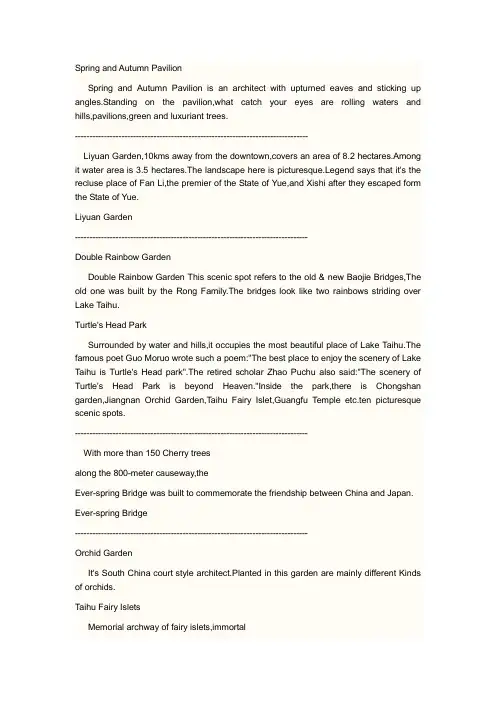
Spring and Autumn PavilionSpring and Autumn Pavilion is an architect with upturned eaves and sticking up angles.Standing on the pavilion,what catch your eyes are rolling waters and hills,pavilions,green and luxuriant trees.--------------------------------------------------------------------------------Liyuan Garden,10kms away from the downtown,covers an area of 8.2 hectares.Among it water area is 3.5 hectares.The landscape here is picturesque.Legend says that it's the recluse place of Fan Li,the premier of the State of Yue,and Xishi after they escaped form the State of Yue.Liyuan Garden--------------------------------------------------------------------------------Double Rainbow GardenDouble Rainbow Garden This scenic spot refers to the old & new Baojie Bridges,The old one was built by the Rong Family.The bridges look like two rainbows striding over Lake Taihu.Turtle's Head ParkSurrounded by water and hills,it occupies the most beautiful place of Lake Taihu.The famous poet Guo Moruo wrote such a poem:"The best place to enjoy the scenery of Lake Taihu is Turtle's Head park".The retired scholar Zhao Puchu also said:"The scenery of Turtle's Head Park is beyond Heaven."Inside the park,there is Chongshan garden,Jiangnan Orchid Garden,Taihu Fairy Islet,Guangfu Temple etc.ten picturesque scenic spots.--------------------------------------------------------------------------------With more than 150 Cherry treesalong the 800-meter causeway,theEver-spring Bridge was built to commemorate the friendship between China and Japan.Ever-spring Bridge--------------------------------------------------------------------------------Orchid GardenIt's South China court style architect.Planted in this garden are mainly different Kinds of orchids.Taihu Fairy IsletsMemorial archway of fairy islets,immortalmeeting bridge,Immortal Buddha cave arethe main scenic spots.--------------------------------------------------------------------------------In the "Burning of Chibi"trick battle-field,tourist can enjoy the spectacularraging fire battle scenes everyday.Burning of Chibi--------------------------------------------------------------------------------Three heroes fighting against LubuThe performance can let you experience a fierce fightRighteously liberate Gaotang PrefectureThe performance《Righteously liberate Gaotang Prefecture》will attract you not to tear yourself away.--------------------------------------------------------------------------------It's the location where Emperor Tangminghuang and Concubine Yangguifei spent their summers.Chenxiang Pavilion--------------------------------------------------------------------------------The preformance ofmusic and dance in Tang DynastyIt embodies the spectacular celebration scenes of imperial court when Emperor Tangminghuang was in power.Nine Tribes VillageUnity Garden is located in the lakeside.Asa Taiwan culture garden,here you can appreciate Taiwan unique natural sceneries and longhistory traditional culture.--------------------------------------------------------------------------------Xiangfu Temple is the birthplace of Faxiang Sect-one of the four greatest sects of Chinese Buddhism.Legend says that when Monk Tangseng passed by here after pilgrimage to the west,he ordered his disciple-Kuiji to open Xiangfu Temple here.Xiangfu Temple--------------------------------------------------------------------------------NO.1 Bell in South China3.8m high,2.5m in diameter,12.8 tons in weight.NO.1 Palm under Heaven11.7m high,5.5m wide and 13 tons in weight.--------------------------------------------------------------------------------8.8m high,12.8 tons in weight.It's made of bronze.NO.1 Tripod in China--------------------------------------------------------------------------------NO.1 Screen Wall in China39.8m long,7m high and 1.3m thick.Dragon's Head ParkWuxi Lake Taihu National Tourist Resort is situated in Mashan and is one of the first national tourist resorts approved by the State Council.--------------------------------------------------------------------------------Moon Bay Resort is built in a fictitious land of peace.Wood house,villas,barbecue camp,fishing ponds,orchard are all available.Moon Bay Resort--------------------------------------------------------------------------------Flower StreamPlum Garden was built on the site-"small peach garden",which was the former private garden of brother Rong Zongjing and Rong Desheng in 1912.The whole scenic spot is artistically spaced and has magnificent layout.Qingming BridgeWith the link of the Grand Canal,Scenic Belt along the Grand Canal connects Nanchan Temple,Nanchang Street,Qingming Bridge ,Jichang Garden,Huishan Hill Historic Site and links up Huangbu Islet,Xishui Islet.Chongan Temple,City Garden,Donglin Academy of Classical Learning,Former Residence of Xue Fucheng and Qian Zhongshu etc.cultural relics.Traditional art crafts,such as silk reeling products,clay figurines full embody South China's characteristics.--------------------------------------------------------------------------------Huangbu Islet is on the canal with aBuddhist temple on it.The islet has been an attraction since the Tang and Song Dynasties and was visited several times by emperors.Huangbu Islet--------------------------------------------------------------------------------Nanchan TempleNanchan Temple is one of the 480 temples in South Dynasty.It's the most flouirish section along the Ancient Grand Canal.Xihui ParkXihui Park is located in the western suburb of Wuxi. It possesses Xishan hill, Huishan Hill and ruins of Huishan Hill Temple. In the park, there are jichang Garden-----the masterpiece of hillside villa garden in China, and the Second Best Spring under Heaven------named by the tea expert Lu Yu in Tang Dynasty.--------------------------------------------------------------------------------It lies in the southeast of Yixing.It's one of our earliest national manrenovated and management scenic spots.Shanjuan Cave--------------------------------------------------------------------------------Pottery CapitalReputed as the palace of pottery art-China Yixing Pottery Museum is located in Dingshu Township, Yixing City.Jiangyin Yangtze River BridgeJiangyin Yangtze River Bridge is China's No.1 and world's No.4 wide stride wire suspension bridge. The main stride arrives to 1385m.--------------------------------------------------------------------------------Park of the Goose's Mouth is a good place to see the Yangtze River and the new bridge.Park of the Goose's Mouth--------------------------------------------------------------------------------Tomb of TaiboTomb of Taibo is on the southern slope of Hongshan Hill in Hongsheng Township, Xishan City.Wuxi is located in the southern part of Jiangsu Province, north of the Yangtze River, Taihu Lake south; to T aihu Lake and famous, is a long history and beautiful city, "Little Shanghai" and the "land of plenty" reputation.Wuxi area of about 5000 square kilometers, population 2.4 million. In the past two decades, Wuxi, a small place, but now has developed into a modern metropolis, now all the people of Wuxi had a happy and prosperous life.。
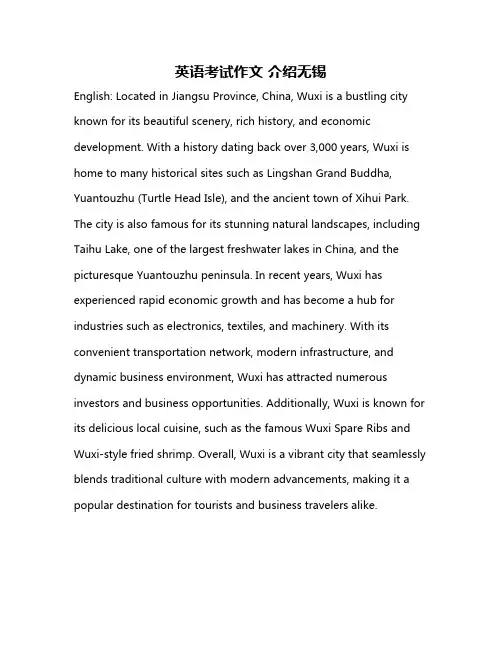
英语考试作文介绍无锡English: Located in Jiangsu Province, China, Wuxi is a bustling city known for its beautiful scenery, rich history, and economic development. With a history dating back over 3,000 years, Wuxi is home to many historical sites such as Lingshan Grand Buddha, Yuantouzhu (Turtle Head Isle), and the ancient town of Xihui Park. The city is also famous for its stunning natural landscapes, including Taihu Lake, one of the largest freshwater lakes in China, and the picturesque Yuantouzhu peninsula. In recent years, Wuxi has experienced rapid economic growth and has become a hub for industries such as electronics, textiles, and machinery. With its convenient transportation network, modern infrastructure, and dynamic business environment, Wuxi has attracted numerous investors and business opportunities. Additionally, Wuxi is known for its delicious local cuisine, such as the famous Wuxi Spare Ribs and Wuxi-style fried shrimp. Overall, Wuxi is a vibrant city that seamlessly blends traditional culture with modern advancements, making it a popular destination for tourists and business travelers alike.中文翻译: 位于中国江苏省的无锡市,是一座以美丽风景、悠久历史和经济发展而闻名的繁华城市。
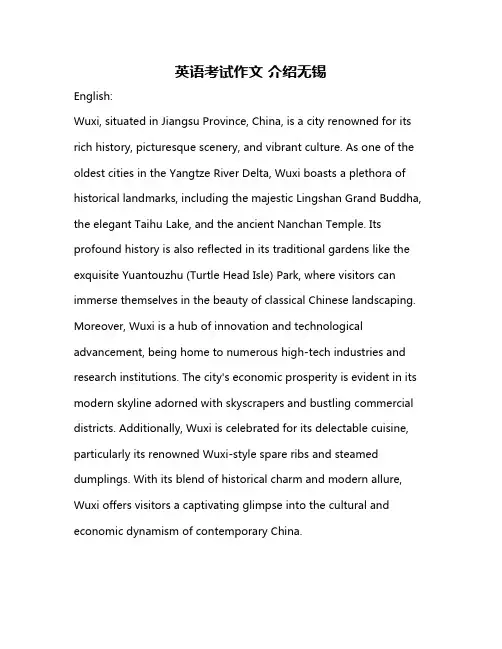
英语考试作文介绍无锡English:Wuxi, situated in Jiangsu Province, China, is a city renowned for its rich history, picturesque scenery, and vibrant culture. As one of the oldest cities in the Yangtze River Delta, Wuxi boasts a plethora of historical landmarks, including the majestic Lingshan Grand Buddha, the elegant Taihu Lake, and the ancient Nanchan Temple. Its profound history is also reflected in its traditional gardens like the exquisite Yuantouzhu (Turtle Head Isle) Park, where visitors can immerse themselves in the beauty of classical Chinese landscaping. Moreover, Wuxi is a hub of innovation and technological advancement, being home to numerous high-tech industries and research institutions. The city's economic prosperity is evident in its modern skyline adorned with skyscrapers and bustling commercial districts. Additionally, Wuxi is celebrated for its delectable cuisine, particularly its renowned Wuxi-style spare ribs and steamed dumplings. With its blend of historical charm and modern allure, Wuxi offers visitors a captivating glimpse into the cultural and economic dynamism of contemporary China.中文翻译:无锡位于中国江苏省,以悠久的历史、如画般的景色和充满活力的文化而闻名。
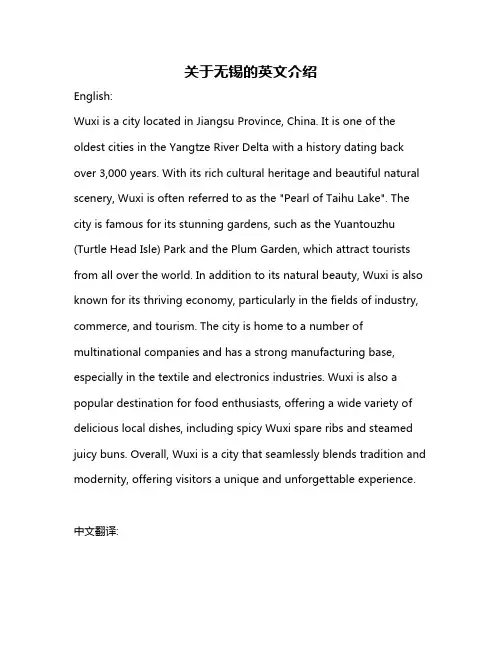
关于无锡的英文介绍English:Wuxi is a city located in Jiangsu Province, China. It is one of the oldest cities in the Yangtze River Delta with a history dating back over 3,000 years. With its rich cultural heritage and beautiful natural scenery, Wuxi is often referred to as the "Pearl of Taihu Lake". The city is famous for its stunning gardens, such as the Yuantouzhu (Turtle Head Isle) Park and the Plum Garden, which attract tourists from all over the world. In addition to its natural beauty, Wuxi is also known for its thriving economy, particularly in the fields of industry, commerce, and tourism. The city is home to a number of multinational companies and has a strong manufacturing base, especially in the textile and electronics industries. Wuxi is also a popular destination for food enthusiasts, offering a wide variety of delicious local dishes, including spicy Wuxi spare ribs and steamed juicy buns. Overall, Wuxi is a city that seamlessly blends tradition and modernity, offering visitors a unique and unforgettable experience.中文翻译:无锡位于中国江苏省,是长江三角洲地区最古老的城市之一,有着三千多年的历史。
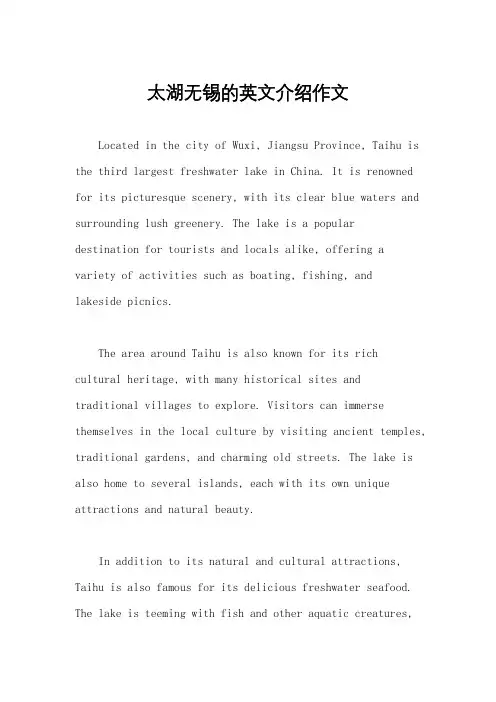
太湖无锡的英文介绍作文Located in the city of Wuxi, Jiangsu Province, Taihu is the third largest freshwater lake in China. It is renowned for its picturesque scenery, with its clear blue waters and surrounding lush greenery. The lake is a populardestination for tourists and locals alike, offering avariety of activities such as boating, fishing, andlakeside picnics.The area around Taihu is also known for its richcultural heritage, with many historical sites andtraditional villages to explore. Visitors can immerse themselves in the local culture by visiting ancient temples, traditional gardens, and charming old streets. The lake is also home to several islands, each with its own unique attractions and natural beauty.In addition to its natural and cultural attractions, Taihu is also famous for its delicious freshwater seafood. The lake is teeming with fish and other aquatic creatures,which are a staple of the local cuisine. Visitors can sample a variety of dishes made with the freshest ingredients, including steamed fish, braised shrimp, and savory soups.For those seeking a more active experience, Taihuoffers a range of outdoor activities such as hiking, cycling, and birdwatching. The lake is surrounded by scenic trails and parks, providing ample opportunities for nature lovers to explore the diverse flora and fauna of the region. Birdwatchers can also spot a variety of migratory birdsthat make their home in the wetlands around the lake.In conclusion, Taihu in Wuxi is a must-visitdestination for anyone looking to experience the natural beauty, rich culture, and delicious cuisine of this region. Whether you're interested in leisurely boat rides,exploring historical sites, or indulging in fresh seafood, Taihu has something to offer for everyone. So, why not plan a trip to Taihu and discover all that this enchanting lake has to offer?。
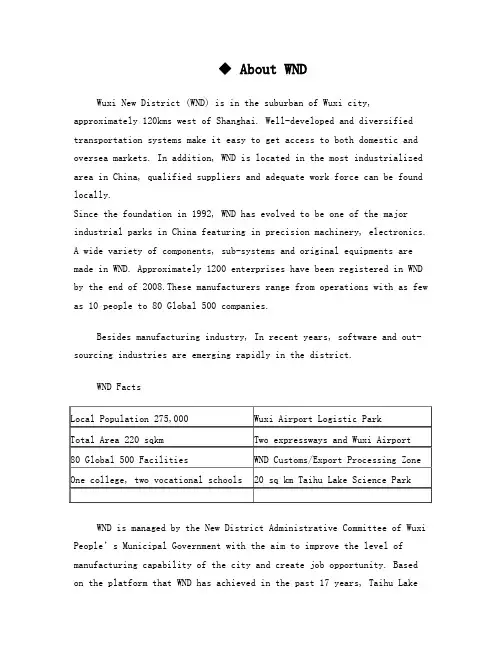
◆ About WNDWuxi New District (WND) is in the suburban of Wuxi city, approximately 120kms west of Shanghai. Well-developed and diversified transportation systems make it easy to get access to both domestic and oversea markets. In addition, WND is located in the most industrialized area in China, qualified suppliers and adequate work force can be found locally.Since the foundation in 1992, WND has evolved to be one of the major industrial parks in China featuring in precision machinery, electronics.A wide variety of components, sub-systems and original equipments are made in WND. Approximately 1200 enterprises have been registered in WND by the end of 2008.These manufacturers range from operations with as few as 10 people to 80 Global 500 companies.Besides manufacturing industry, In recent years, software and out-sourcing industries are emerging rapidly in the district.WND FactsWND is managed by the New District Administrative Committee of Wuxi People’s Municipal Government with the aim to improve the level of manufacturing capability of the city and create job opportunity. Based on the platform that WND has achieved in the past 17 years, Taihu LakeScience Park was launched in 2006 to accommodate R&D and technology innovation as the requirement of ever increasing amount manufacturing.If your company is in site selection process in China, please come and visit WND.◆ OthersWuxi New District is a district of Wuxi in Jiangsu Province. The district has an area of 220 km2 and a population of around 275,000.In the 1992 the district was founded as an industrial zone in order to attract large foreign companies. It is home to many such companies such as hard disk maker Seagate, the Japanese electrical giant Sony and Matsushita Electric among others.◆ WuxiWuxi is an old city in Jiangsu province, People's Republic of China. Split into halves by Lake Taihu, Wuxi borders Changzhou to the west and Suzhou to the east. The northern half looks across to Taizhou to the north over the Yangtze River, while the southern half also borders the province of Zhejiang to the south. Wuxi earned its nickname “Pearl of Lake Tai” because it’s built on the shore of Lake Tai with beautiful sceneries. Wuxi was also dubbed "little Shanghai" because of its close proximity to the city and its fast urbanization and booming economy.? nameWuxi means "No tin", though scholars suggest the city name may come from "Wuxu" (吳墟), meaning ruins of Wu (state), or a Baiyue word which may mean "god bird".History? Zhou DynastyWuxi was founded 3,000 years ago by two fugitive princes, Taibo and Zhongyong, of Zhou from northern China, who intended to give their brother "Jili" (季歷) the throne. The two princes settled down in "meili" (梅里), which is believed to be today's Meicun of Wuxi (albeit some historic records lead to somewhere in today's Suzhou). They helped developing local agriculture and waterways and soon this area flourished. After the death of Taibo, because Taibo has no son, the emperor of Zhou named a descendant of his family king of kingdom "Wu". The king called his kingdom itself "Gowu". Taibo's shrine was set up in today's Meicun and the original wood structure was destroyed during the wars over the course of history. It has been renovated several times and today's architecture is mostly from Qing dynasty. A stone carved with Confucius' comment can still be seen in today's Taibo Shrine.? Spring and Autumn Period and Warring States PeriodWu became one of the strongest kingdoms during the spring and autumn period. Sunzi (Suntzu), who wrote the famous "the Art of War" came to Wu and helped the king in military affairs. Wu was consideredone of the seven strongest kingdoms during Spring and Autumn Period . Some of Sunzi's descendants are still living in Sunxiang in Wuxi nearthe Plum Garden. However, Wu was defeated by Yue (today's Zhejiang andFujian) later on, which was also defeated by Chu later and Wu became part of Chu during the Warring States Period.? Qin and Han DynastyThe culture and economy center of the "Wu" area shifted to Suzhou after Qin Shi Huang, the first emperor of Qin Dynasty united China and Wuxi belonged to Suzhou back then. During the Han dynasty, Wuxi was set up as a county by the emperor Han Wudi. Historic records showed that tin was discovered during the early Han era, leading to conflicts in the area. Soon, however, the tin was depleted. This is generally believed to be the origin of the name Wuxi, meaning "no tin." Recent scholarship has brought this explanation into doubt, however. It is claimed that "Wu" is one of the auxiliary suffixes common in the local dialect. This is similar to referring to Suzhou as "Gusu" and Wu as "Gowu". The name was changed to Youxi (有錫), meaning "having tin", during the Wang Mang conflicts period because Wang wanted to change the name.。
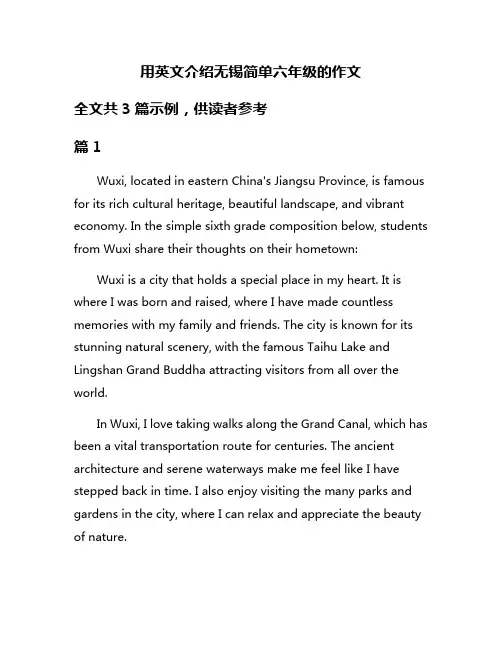
用英文介绍无锡简单六年级的作文全文共3篇示例,供读者参考篇1Wuxi, located in eastern China's Jiangsu Province, is famous for its rich cultural heritage, beautiful landscape, and vibrant economy. In the simple sixth grade composition below, students from Wuxi share their thoughts on their hometown:Wuxi is a city that holds a special place in my heart. It is where I was born and raised, where I have made countless memories with my family and friends. The city is known for its stunning natural scenery, with the famous Taihu Lake and Lingshan Grand Buddha attracting visitors from all over the world.In Wuxi, I love taking walks along the Grand Canal, which has been a vital transportation route for centuries. The ancient architecture and serene waterways make me feel like I have stepped back in time. I also enjoy visiting the many parks and gardens in the city, where I can relax and appreciate the beauty of nature.One of the things that make Wuxi special is its rich cultural heritage. The city is home to many historical sites, such as the Nanchan Temple and the Huishan Ancient Town. These places are a reminder of Wuxi's long and storied past, and I feel proud to be a part of such a vibrant and historical city.In addition to its natural beauty and cultural attractions, Wuxi is also a hub for innovation and technology. The city is known for its thriving economy and is home to many high-tech companies, such as Huawei and Suntech. As a student in Wuxi, I am grateful for the opportunity to learn from some of the brightest minds in the industry.Overall, Wuxi is a city that is close to my heart. Its natural beauty, rich history, and dynamic economy make it a truly special place to call home. I am proud to be a part of this vibrant community and look forward to seeing what the future holds for my beloved city.篇2IntroductionWuxi, a city in China, is known for its beautiful scenery, rich culture, and delicious food. In this document, I will introduce asimple sixth-grade essay about Wuxi, written by a student from Wuxi.BodyThe essay starts with a brief introduction about Wuxi, highlighting its location in eastern China and its long history. The student then goes on to describe the city's famous landmarks, such as the Lingshan Grand Buddha, Taihu Lake, and the Nanchan Temple. The student also mentions Wuxi's thriving economy and the development of industries like textiles and electronics.One of the key points in the essay is the student's love for Wuxi's local cuisine. The student talks about the deliciousWuxi-style spare ribs, steamed dumplings, and fried rice cakes that are popular in the city. The student also mentions the famous Wuxi-style noodles, which are known for their unique texture and flavor.In addition to the city's attractions and food, the student also highlights the friendly people of Wuxi and the warm hospitality they show to visitors. The student describes how the local residents are always willing to help others and make them feel welcome in the city.The essay concludes with a summary of the student's overall impression of Wuxi. The student expresses pride in their hometown and encourages others to visit and experience all that Wuxi has to offer.ConclusionIn conclusion, this simple sixth-grade essay about Wuxi showcases the city's beauty, culture, and hospitality through the eyes of a young student. The essay not only highlights Wuxi's famous landmarks and delicious cuisine but also emphasizes the kindness of its people. Overall, this essay is a wonderful tribute to Wuxi and its many charms.篇3Wuxi is a beautiful city located in Jiangsu Province, China. It is known for its scenic Lake Tai, historic temples, and delicious local cuisine. In this document, we will introduce the simple composition written by a sixth-grade student in Wuxi.The sixth-grade student in Wuxi wrote a composition about his weekend trip to Xihui Park. Xihui Park is a large park located in Wuxi that is famous for its lush greenery, serene lakes, andhistoric buildings. The student described how he visited the park with his family on a sunny Saturday morning.In the composition, the student vividly described the sights and sounds of Xihui Park. He talked about how they walked along the tree-lined paths, feeding the ducks in the lake, and admiring the colorful flowers in the botanical garden. The student also mentioned visiting the ancient Xihui Monastery, a historic temple located within the park.The student's composition was well-organized and engaging, with a clear introduction, body, and conclusion. He used descriptive language to paint a picture of the park for his readers, and his enthusiasm for the subject matter shone through in his writing.Overall, the sixth-grade student's composition about his trip to Xihui Park was a simple yet engaging piece of writing. It showcased his love for his hometown of Wuxi and his ability to convey his experiences in a clear and engaging manner. In the future, we hope to see more creative and well-written compositions from this talented young writer.。
无锡英文作文介绍Wuxi, a city located in Jiangsu Province, is a vibrant and bustling metropolis in China. It is known for its beautiful scenery, rich history, and rapid economic development.The city is famous for its stunning natural landscapes, including the famous Taihu Lake, which is the third largest freshwater lake in China. The lake is surrounded by picturesque mountains and lush greenery, making it a popular destination for tourists and nature lovers.In addition to its natural beauty, Wuxi is also home to many historical and cultural attractions. The city has a long history dating back to ancient times, and it is filled with ancient temples, traditional gardens, and well-preserved historic sites that offer a glimpse into thecity's past.Wuxi is also a modern and thriving city with a strongeconomy and a vibrant cultural scene. It is known for its high-tech industry, manufacturing, and trade, and it is home to many multinational companies and research institutions. The city also hosts a variety of cultural events, festivals, and exhibitions that showcase its rich heritage and contemporary creativity.The local cuisine in Wuxi is another highlight of the city. Wuxi is famous for its delicious local dishes, such as braised spare ribs, fried gluten puffs, and steamed meat buns. The city's food scene is diverse and vibrant,offering a wide range of culinary delights for visitors to enjoy.Overall, Wuxi is a dynamic and diverse city that offers a unique blend of natural beauty, rich history, and modern development. Whether you are interested in exploring ancient temples, enjoying scenic landscapes, or experiencing the bustling city life, Wuxi has something to offer for everyone.。
介绍无锡的英语作文Introduction to Wuxi。
Wuxi, a city located in the eastern part of China, is a vibrant and modern metropolis with a rich history and cultural heritage. It is known for its picturesque scenery, thriving economy, and warm-hearted people. In this article, I will introduce you to the fascinating city of Wuxi.Geographically, Wuxi is situated in the southern partof Jiangsu Province, adjacent to the Yangtze River andTaihu Lake. The city spans an area of approximately 4,785 square kilometers and has a population of over 6 million people. Wuxi enjoys a subtropical monsoon climate, withmild winters and hot summers, making it a pleasant place to visit throughout the year.Wuxi is famous for its stunning natural landscapes,with Taihu Lake being one of its most prominent attractions. The lake covers an area of 2,250 square kilometers and isthe third-largest freshwater lake in China. Visitors can enjoy a boat ride on the lake, explore the numerous islands, or simply relax by the shore while taking in the breathtaking views.Apart from its natural beauty, Wuxi also boasts a rich cultural heritage. The city is home to many historicalsites and ancient temples, such as the Lingshan Grand Buddha, Nanchan Temple, and Huishan Ancient Town. These landmarks offer visitors a glimpse into the city's past and showcase its architectural and artistic achievements.In addition to its historical significance, Wuxi isalso a modern and prosperous city. It is known as the"Little Shanghai" due to its rapid economic development and thriving industries. Wuxi is a major center for manufacturing, particularly in the fields of textiles, machinery, and electronics. The city is also a hub for research and development, with many high-tech companies and research institutions located here.Furthermore, Wuxi is a culinary paradise for foodenthusiasts. The city is famous for its delicious local dishes, such as Wuxi-style spare ribs, steamed meat buns, and freshwater fish. Visitors can explore the bustling street food markets or dine in one of the many traditional restaurants to savor the authentic flavors of Wuxi cuisine.In terms of transportation, Wuxi is well-connected to other major cities in China. It has a convenient transportation network, including an international airport, high-speed railway, and a comprehensive public transportation system. This makes it easily accessible for both domestic and international travelers.In conclusion, Wuxi is a city that seamlessly blendsits rich history with modern development. From its stunning natural landscapes to its cultural heritage and economic prosperity, Wuxi has something to offer to every visitor. Whether you are interested in exploring historical sites, enjoying scenic beauty, or experiencing the vibrant city life, Wuxi is a destination worth visiting.。
无锡英语初二作文模板英文回答:1. Introduction。
Wuxi is a beautiful city located in the eastern part of China's Jiangsu Province. It is known for its rich history, beautiful scenery, and bustling economy. With a population of over 6.5 million people, Wuxi is one of the most populous cities in China.2. History。
Wuxi has a long and rich history dating back to the Spring and Autumn Period (771-476 BC). The city was first known as Meili, and it was later renamed Wuxi in the 3rd century AD. During the Tang Dynasty (618-907), Wuxi became an important trading center. In the 13th century, the city was conquered by the Mongols and became part of the Yuan Dynasty (1271-1368). After the Yuan Dynasty collapsed, Wuxiwas ruled by a succession of warlords. In 1949, Wuxi became part of the People's Republic of China.3. Geography。
用英文介绍无锡简单六年级的作文Wuxi is a beautiful city located in Jiangsu Province, China. It is known for its rich history, picturesque scenery, and vibrant culture. In this article, we will introduce the simple sixth-grade composition in Wuxi.The sixth-grade composition in Wuxi covers a wide range of topics that are relevant to the daily lives of students. Students are encouraged to express their thoughts and ideas in a clear and concise manner. Some of the common themes that students write about include their favorite hobbies, family traditions, school life, and aspirations for the future.In order to help students improve their writing skills, teachers in Wuxi provide guidance and feedback on the compositions. They encourage students to use descriptive language, organize their ideas logically, and pay attention to grammar and punctuation. Through practice and feedback, students are able to develop their writing skills and become more confident in expressing themselves through written language.In addition to improving writing skills, the sixth-grade composition in Wuxi also helps students develop critical thinkingand analytical skills. By expressing their thoughts and ideas on various topics, students learn to think critically about different perspectives and form their own opinions. This is an important skill that will benefit students not only in their academic studies but also in their future careers.Overall, the sixth-grade composition in Wuxi is an important part of the curriculum that helps students improve their writing skills, develop critical thinking, and express themselves in a clear and concise manner. Through practice and feedback, students are able to become more confident writers and thinkers, which will benefit them in their academic and personal lives.。
用英文介绍无锡简单六年级的作文My Hometown - WuxiHi there! My name is Li Ming and I'm a 6th grader at Wuxi No.1 Primary School. Today I want to tell you all about my amazing hometown - Wuxi. It's a really cool city in Jiangsu Province, eastern China.Wuxi is famous for being one of the oldest cities in the Yangtze River Delta area. It has a super long history going back over 3,000 years! There are so many interesting historical sites and relics here. One of the most well-known is Li Garden, a beautiful classical garden built hundreds of years ago. With ponds, pavilions, rockeries and plants everywhere, it feels like stepping back in time when you visit.Another iconic Wuxi landmark is Lingshan Grand Buddha, one of the largest Buddha statues in China. The giant Buddha is 88 meters tall and looks incredibly peaceful sitting there on the hill. Every year lots of tourists come to see this amazing sight and walk up the stairs to reach the Buddha's feet.As well as being an ancient city, Wuxi is also famous for being a "Bright Pearl" industrial hub nowadays. Huge companies like Volkswagen and Delphi have factories here making cars andauto parts. My dad actually works at the Volkswagen plant - that's why we ended up living in Wuxi after he got a job there when I was little.Speaking of factories, Wuxi is also known for producing high-quality silk and textiles. The local silk is just beautiful and super soft. My mom loves buying silk scarves and dresses from the fabric markets. Sometimes the whole family goes on weekends to watch the skilled craftspeople hand-making traditional silk products.Wuxi people are also really into a special kind of Chinese opera called Kun Opera. Instead of singing loudly, Kun Opera has very gentle melodic arias. The performers wear beautiful makeup and costumes and do graceful choreographed moves. It's mesmerizing to watch, like a slow dance on stage. Every year there are big Kun Opera festivals and competitions held at theaters around Wuxi.In my free time, I love riding my bike along the canals and rivers crisscrossing the city. Wuxi used to be called the "Venice of the East" because of the huge canal network left over from ancient times. Pedaling past the little boats, old stone bridges and willow trees hanging over the water feels so peaceful and relaxing.Overall, Wuxi truly is an amazing place combining ancient history and culture with booming modern industries. From the classical gardens to the giant Buddha statue to the delicious local cuisine, there is so much for visitors to see and experience here. I feel really lucky to call this fascinating city my hometown. If you ever get a chance to visit Wuxi, you'll understand why we're all so proud of where we're from!。
介绍无锡作文英文英文:Wuxi is a beautiful city located in Jiangsu Province, China. It is known for its rich history, stunning scenery, and vibrant culture. The city is also famous for its delicious local cuisine, such as the famous Wuxi spare ribs and Wuxi-style braised pork. 。
I have visited Wuxi several times and each time I am amazed by its charm. The city is home to many historical sites, including the Lingshan Grand Buddha, the Nanchan Temple, and the Yuantouzhu scenic area. These attractions offer a glimpse into the city's rich cultural heritage and are definitely worth a visit.In addition to its historical and cultural attractions, Wuxi is also a modern and bustling city. The city has a thriving economy and is known for its high-tech industry, particularly in the fields of electronics and renewableenergy. The city's impressive skyline and modern infrastructure are a testament to its rapid development.One of my favorite things to do in Wuxi is to take a leisurely stroll along the beautiful Taihu Lake. The lake is a popular spot for locals and tourists alike, offering stunning views and a peaceful atmosphere. There are also many charming tea houses and restaurants along the lake where you can relax and enjoy the scenery.Overall, Wuxi is a city that offers a perfect blend of history, culture, and modernity. It is a place where tradition meets innovation, and where you can experience the best of both worlds. I always look forward to my next visit to this amazing city.中文:无锡是一个位于中国江苏省的美丽城市。
浅谈无锡
下午好,女士们,先生们!
无锡市,绿色和诗意的城市。
我的名字是崔建州。
你可以叫我成龙。
我在这里您当地的导游在无锡。
这是我们的驱动程序:李先生。
他非常有经验和有益的。
论无锡中国国际旅行社,Mr.Li 和我本人的名义,我想最热烈地欢迎各位。
我们感到非常荣幸为您服务在您在无锡逗留。
我们将尽力让您住在这里愉快。
您的理解与合作将得到高度赞赏。
我们的车前往的湖滨饭店,这是在位于蠡湖湖。
你将会发现它是真正的理想住宿地点。
我们要在大约20分钟到达那里。
主席!你去过无锡前?谢谢您!对于您最,我想,这是你第一次来无锡。
当你在这里,您将了解我们的文化和历史。
现在,请允许我向大家作一个简要介绍。
我们知道,无锡是作为一个漂亮,典型的江南村有名。
萨之前,我们要深入为无锡,我们必须了解的话:江南。
对于人民,江南不仅是一个地理名称,但也是一个有特殊意义长远。
当我们说江南,然而,我们首先想到蓝色和绿色的水山风景秀丽,柳树和舞蹈与家庭之间流动溪流两旁桃树开花,以及现场的小桥。
它是作为一个鱼米之乡,土地被大量区域的在你的文字,牛奶和蜂蜜的土地。
它吸引了许多游客,包括皇帝很多,尤其是清朝康熙,乾隆,此外,江南色变将在我们心中引起水的图片。
它是由长江和太湖Lake.Wuxi包围是对太湖的一颗璀璨明珠。
几乎所有来到无锡谁知道为什么会这样一个美丽的地方有了这样一个名字。
我亲爱的朋友们。
你对此有何看法?这位先生?据记载,在周朝和秦朝,无锡,在丰富的金属锡往往是用来制造武器古代times.Tin可以锻炼的武器,并使其更加有效地在战场上。
因此,这个地方被认为极了所有的中国在该州的重要时期。
最近,一个石碑被发现在西山脚下,在它的字“战争会继续,如果有锡,和平正值不再有锡”。
事实上,直到汉初,由于locals'overdigging,没有更多的锡和城市被命名为“无锡市”,这意味着无锡也表明当地人希望是和平和稳定。
无锡在江苏Provinve东南部和长江三角洲的中心部分。
无锡市总面积4600多平方公里,总人口约4.6million,包括超过200万城市居民。
它距上海一二七公里其东部和一八三公里距南京,江苏省的省会,西面..
京杭大运河贯穿市区。
一旦这种长期水道中发挥了在旧时代的城市商业发展的重要作用。
它是仍在工作,而且在运输,如煤炭,钢铁和建筑材料等大件物品。
这条运河也有历史的画廊声誉和活生生的纪念碑。
作为江南古城领土,无锡有超过3000多年的历史。
早在3000年前(约公元前11世纪),以使王位给他的弟弟吉利,台玻,国王的周大最古老的北方部落的儿子,来到这里从今天的山西省和他的兄弟中庸和设置加快Gouwu国家在锡山区(今梅村)。
泰波促进了中部和南部的中华文化的结合,创造了新的文明,吴文化众所周知的。
他被认为是国家的祖先武,并一直尊重和3000年的荣幸,因为他不仅造成了国家,也为人们的生活更好的土地。
现在,泰伯庙和泰伯墓古迹仍保留在无锡,无锡自然是作为吴文化bithplace认为。
无锡被认为是我国民族工商业的发祥地。
随着发展,无锡工业家和企业家来到与Rongs'兄弟,因为他们的杰出代表,荣宗敬和戎得甥脱颖而出。
相比上海,无锡是小得多的规模。
但它被认为是相似的繁荣民族工商业的上海,因此,它被认为是“微型上海被誉为”。
无锡已变成一个现代化的工业城市,因为中国走上了改革开放的道路,向外部世界。
今天,它拥有4000个合资企业。
其中超过100个属于世界500强。
更糟糕的是在2008年,无锡市的国内生产总值居中国第八位。
对同意的肥沃土壤和气候下,当地人民做一年两熟,一种作物冬小麦和水稻作物之一。
和当地特产无锡市猪肉排骨,竹笋,蜂蜜和,水蜜桃,杨梅,柑橘,泥人,培养淡水珍珠。
宜兴市2县的一个县级市的无锡市,是著名的在家中,其陶瓷产品,特别是国外的紫砂茶壶。
为此,宜兴得到了绰号“陶瓷之都”。
在您入住期间在这里,你将有机会欣赏,或买一些,如果你想。
在其超过3000年记录的历史,无锡从来没有遭受任何严重的自然灾害,并在无锡人在这里一直生活在一个安全,幸福的生活。
无锡有一个日益增长的人才,谁取得了如诗人唐代,旅行者徐霞客对明代,外交官薛夫橙清代坤对中国的经济和文化发展的伟大贡献...音乐星系甲冰,画家徐悲鸿,作家钱钟书,科学家周培源,钱伟长,在现代中国等。
无锡有一个四季分明,气候温和潮湿。
它有一个美丽的自然风光。
它的景观水和mountains.Taihu湖取决于不深,但扩张和多变,西山山不高,但相当的inviting.Wuxi集成功能的河流,湖泊和喷泉,形成了江南村的独特风格。
女士们,先生们,我们是在抵达酒店。
这是我对无锡简要介绍,并感谢您的关注。
让我们准备下车。
请继续valueables牢记我们的巴士号码:70788。